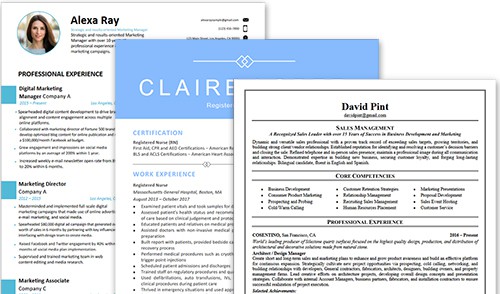Why Your Resume Doesn’t Need To Be So Long
Longer isn’t necessarily better. Learn why you should keep your resume short and sweet.

I get it. You don’t want to leave anything out. You’ve worked too hard to get where you are today to not mention all of what you’ve done on your resume. After all, longer should be better – right?
Actually, no! This is a common misconception, and while admittedly it does seem to make a whole lot of sense at first, there are many reasons to condense your resume down to one or two pages. In fact, it’s typically advised that unless you’re applying for an executive experience as someone with over 15+ years of work experience, it’s almost always better to stick with exactly one page. Here’s some reasons why a one-page resume is all you need to give the best impression possible to your potential employers.
Oh yes, and let’s not forget, our resume writing services are always here if you need additional assistance working on your resume.
1. It’s usually self-explanatory
If you’ve worked as a store manager at a retail store, it’s pretty self explanatory what you were doing in that position. Chances are, you did what all store managers do, which is, well, manager the store of course!
People can feel compelled to put down everything they did in their most recent job position – and admittedly, if you were a store manager, you probably worked on a plethora of various activities that you could be mentioning on your resume. But really, employers can already infer most of this from the title position, so don’t bother putting it all on your resume. Instead, your bullet points should contextualize two types of activities. The first are the most impressive feats you accomplished for the job. The second are the things you did that perhaps aren’t an obvious give away from reading your job title. By leaving out all the other fluff, you’ll find that you don’t need too much room after all.
2. Too long, well then it’s gone
Recruiters often look at hundreds of resumes a day and this can mean skipping over the ones that seem too time consuming to read. No one’s got time for that detailed 5-page resume that goes into way more specifics than anyone cares to know.
There’s also this unwritten rule that your resume simply shouldn’t be any more than one or two pages. Many recruiters simply think that if your resume is any longer than that, then perhaps you’re simply missing the boat on how resumes are supposed to be written – regardless of anything else. It’s like the old saying goes, the nail that sticks out is the one that gets hammered down.
3. Not everything matters
The objective of your resume is to show that you are the best fit candidate for the job. Unfortunately, many people don’t realize this or fail to consider it when deciding what belongs on a resume and what doesn’t As a result, they end up putting things on there that just takes up space.
It’s tempting to mention that your favorite hobbies are travelling and playing chess. While that’s great and all, ask yourself – do hiring managers really care? Does it show that you’ll be a good fit for the job? If the answer is no, then leave it out and save yourself some space.
4. If it’s so long ago, it’s too long ago
Employers aren’t going to care what you did two decades ago. That was two decades ago and what you did back then will most likely be way less impressive than what you’re doing now – assuming your career has been on the rise over the years. So, if you’ve got experience from 20+ years ago then it’s not worth putting on the resume to begin with and you should edit your resume to remove it. In fact, this type of experience can make you seem like a weaker candidate than you really are.
5. The final word
All our experts agree that resumes are best left short and sweet. If you find yourself with a super long resume, then there’s a good chance that some of it isn’t worth mentioning or can be condensed down to fit the standard one-page resume.
